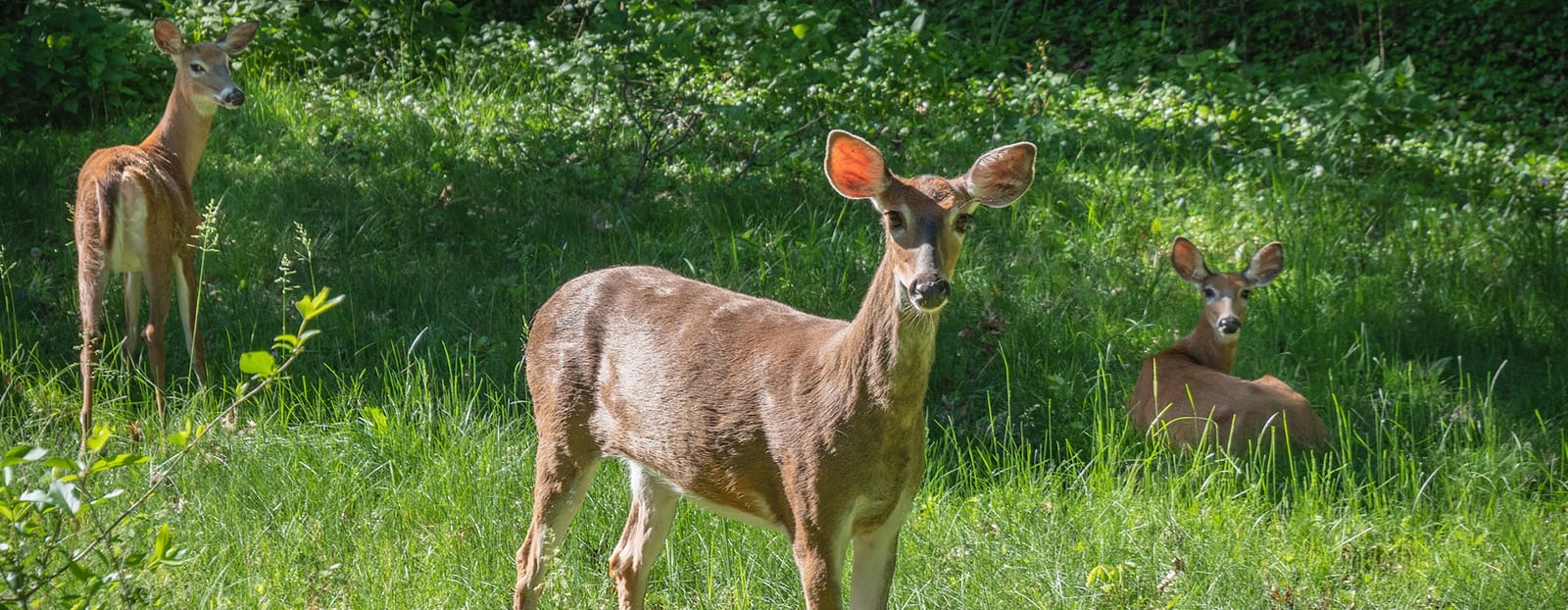The City of Thunder Bay has many species of wildlife. Although we enjoy seeing them in their natural habitat, problems can happen when wild animals make their homes in our backyards. Preventative measures, such as removing garbage and pet food from the vicinity of your house, will reduce the chance of a bad encounter. Learn about the Norway Rat and methods to discourage them from being on your property.
If you see aggressive life-threatening wildlife, call 911 or the local police.
If you see injured or sick larger wildlife (moose, deer, bear, wolf) and/or orphaned wildlife, call the Ministry of Natural Resources at 807-475-1471.
Property owners are responsible for the disposal of small dead animals on their own property.
Contact a Wildlife Agent to remove nuisance wildlife.
Common species of wildlife
Bears |
|
For non-emergency encounters, call the Bear Wise reporting line at 1-866-514-2327 or visit Bear Wise for more information. In a life-threatening emergency, call 911 or the local police. How to prevent bear problems
|
Foxes |
|
Nuisance wildlife calls should be directed to the Ministry of Natural Resources at 807-475-1471. Foxes have no predators and there is plenty of available food, so you can see them in the City. This can happen more often during the fall and winter when there is little cover to hide them. A healthy fox is unlikely to bother you or your pet. They won't consider your pet as food unless you have an outdoor rabbit or other small outdoor caged pet. Unless a fox has learned that humans supply food, a healthy fox will not generally approach humans. Even a toddler is far too large to be seen as prey. A simple clap of the hands, or the banging of cans, will often discourage a fox from approaching. RabiesFoxes can carry rabies in Ontario. Oral vaccination programs of foxes have greatly reduced the spread of the disease. If you see a fox in the city, you should not be concerned unless it appears disoriented, sick, or injured, or is unusually tame. If you see a fox with any of these signs, report it immediately to the Ministry of Natural Resources and Forestry. |
Pigeons |
|
Most pigeons in the City are semi-wild. While they can be fun to watch or feed, large numbers in one area can cause public complaints. You can reduce their number by limiting the number of nesting places and the amount of food available. Those remaining will move on to places where they can still find food and shelter. What attracts pigeons
Methods for pigeon proofing
|
Skunks |
|
Skunks are a member of the weasel family. They are generally nocturnal, but sometimes forage during the day. Skunks are active all year, but stay in their dens during winter. In late spring, they give birth to a litter of from one to seven young. OmnivoresSkunks are omnivorous. They eat everything from small rodents, frogs and insects to garbage, eggs and fallen fruit. In fact, the skunk can be beneficial as most its diet can be harmful insects. Dealing with skunksIf you see a skunk that appears sleepy, overly friendly, staggering or walking in circles, it may be rabid. Do not approach the skunk and notify the Ministry of Natural Resources. If skunks are digging in your yard:
If a skunk is trapped in a window well: Carefully slide in a plank or board to provide a ramp for the skunk, and then make a quick exit to allow the animal to leave. If there is a skunk den under your house or deck: You can partially fill the entrance with a pile of loose dirt to determine when the skunk has left, or install a one-way door. Once skunk has left, permanently seal the opening with a solid wall. Do not try this during May to June when there may be baby skunks in the den. |
Squirrels |
|
In the City, there are many trees, parks and gardens. It is an ideal habitat for squirrels, as food and shelter are plentiful and natural predators do not exist. Damage squirrels can cause
Solving common squirrel problemsTrapping is legal if done humanely, and the animal is released unharmed. Use a trap that lets you capture the animal alive and unharmed and is the right size for squirrels. You can keep them out of bird feeders by placing the feeder in hard-to-reach places. If squirrels are eating your outdoor plants, you can try putting repellents, such as diluted tabasco sauce, cayenne pepper, and bone meal, on soil and over bulbs or plants. Garlic planted near bulbs, moth balls, or ammonia-soaked rags around the perimeter of the garden also help. If you need to remove a squirrel from your home or chimney, call a licensed pest control company. |
Contact Us








